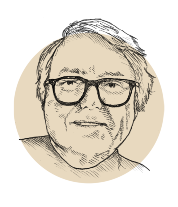As usual, the slate for the first round of voting, to be held on April 10 (the two leading contenders will face off on April 24), is large and varied. More than forty people have officially declared their intention to run. Among the confirmed candidates for the major parties are Marine Le Pen, president of the far-right Rassemblement National; Fabien Roussel, national secretary of the Communist Party; Yannick Jadot, who heads the environmentalist coalition Europe Ecologie-Les Verts; and Jean-Luc Mélenchon, leader of the left-wing La France Insoumise. The choice of standard-bearers for the two mainstream left and right formations – the Parti Socialiste and Les Républicains – is less straightforward. For the socialists, Paris Mayor Anne Hidalgo won the nomination by more than 70% but is currently struggling to make her voice heard outside the major cities.
On the right, the nomination battle went to a second round after a hard-line contender, Eric Ciotti, pulled off a surprise win in the first ballot. He leap-frogged Xavier Bertrand, the expected favorite, and the former European Commissioner Michel Barnier to reach a run-off against Valérie Pécresse, a career politician and former minister under President Nicolas Sarkozy. Both Bertrand and Barnier threw their weight behind Pécresse, who went on to win the nomination. Ms. Pécresse is closer to the center-right, describing herself as “two-thirds Angela Merkel, one-third Margaret Thatcher.” If she were to win in April, she would become the first-ever female president of France, shattering a glass ceiling that many still think is impenetrable.
This year’s election roster also contains ten or so independent candidates from outside the traditional party system. They range from a transgender mayor to a man seeking to “reorient democracy in order to escape Barbarism and open up a brighter Future.” Arguably the most interesting is Martin Rocca, a 22-year-old philosophy major, who has no interest in becoming president but wants to reach the run-off stage in order to represent everyone who is “fed up to the back teeth with the Fifth Republic.” The sentiment of political stasis is indeed felt across a broad swathe of the electorate.
That feeling may well explain the attention paid, both at home and abroad, to the candidacy of Eric Zemmour, a far-right polemicist better known for his incendiary – and sometimes racially libelous – rhetoric on immigration, religion, and national identity. Zemmour made his name as an outspoken journalist for Le Figaro newspaper and later as a talk-show pundit on a right-wing cable TV channel – a sort of French Tucker Carlson. His move into presidential politics was carefully orchestrated during 2021 as he built up an image of a straight-talking outsider unafraid of speaking truth to power. Echoing Donald Trump, he claims to understand the concerns of white, native-French people left behind by globalization and deindustrialization.
More provocatively, he espouses the so-called “great replacement” theory, whereby the indigenous populations of France and the rest of Europe are being ousted by non-white Muslim immigrants from northern and sub-Saharan Africa. Polls regularly evidence Zemmour’s appeal not only to well-off middle-class conservatives reticent to vote for Marine Le Pen but also to younger, working-class voters disenchanted with Le Pen’s longstanding attempt to “normalize” her party by moving it towards the center ground. That broad appeal could deal a fatal blow to the Rassemblement National leader, who is making her third attempt to become president.
The one conspicuously absent candidate is Emmanuel Macron, who has yet to declare officially that he is running for a second presidential term. That said, the groundwork has been laid for quite some time. Mr. Macron has been crisscrossing France, talking to “ordinary people” about local issues. In November, he gave a half-hour televised address that was ostensibly about the coronavirus pandemic but that broadened out to cover economic recovery, national pride, and the advances made under his presidency. Critics have accused the president of playing for time because, once he declares his bid, he will be subject to the same campaign rules and limits as his opponents. But, as Valérie Pécresse rises steadily in the polls and Eric Zemmour continues to hog the limelight, an announcement is expected in the near future. Unless, like his predecessor François Hollande, Macron decides not to run.
In any event, candidates have until March 4 to comply with the legal sponsorship requirement. Could another outsider launch a rival bid in the meantime? Calls have been also made for a single candidate – a former justice minister, Christiane Taubira – to represent all of the left-wing parties. And, despite official denials, the pandemic might force a rescheduling of the April poll. In other words, to quote one official, the situation is “remarkably fluid.”
Article published in the February 2022 issue of France-Amérique. Subscribe to the magazine.












